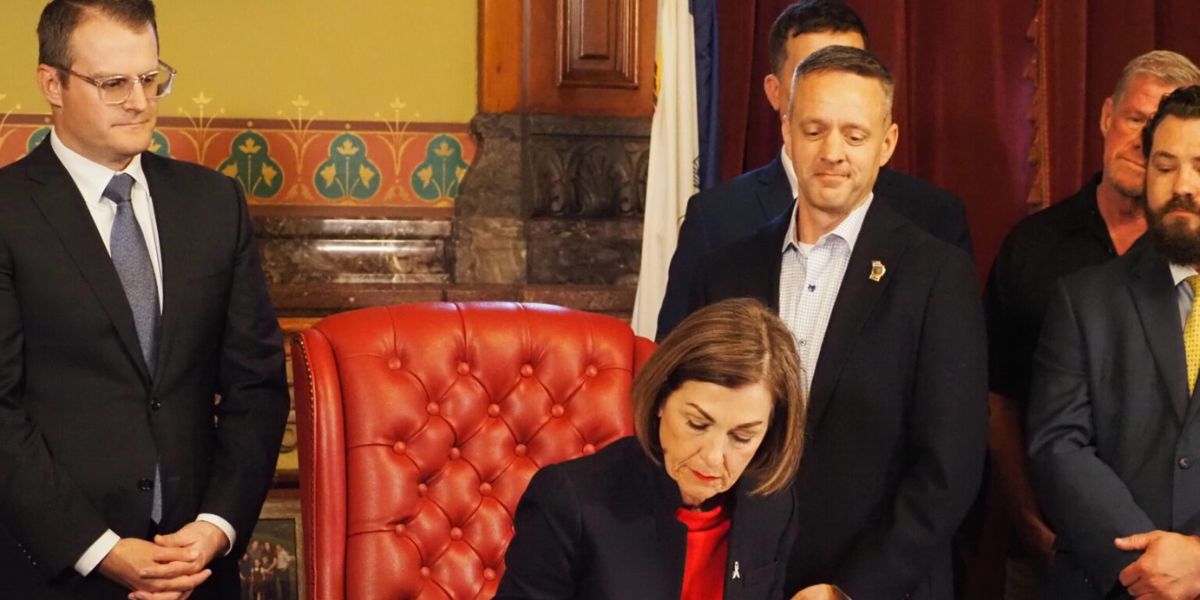Iowa Income Tax Cuts Projected to Save Taxpayers $1.85 Billion Over Next Decade, Study Finds
According to a study conducted by an Iowa research institute, the most recent individual income tax cuts will save income taxpayers $1.85 billion in taxes over the next ten years.
The Common Sense Institute Iowa, the Iowa chapter of a think tank with chapters in Colorado, Washington, and Arizona focused on the “future of free enterprise,” issued the report on Monday. It was written by the institute’s Director of Policy and Research, Ben Murrey, a former campaign and legislative worker for U.S. Senator Ted Cruz, R-Texas.
The study examined the impact of Senate File 2442, a new law from the 2024 legislative session that will reduce Iowa’s individual income tax rate to a 3.9% single rate by 2026. This year’s individual income tax cuts will accelerate the implementation of a 2022 bill that will reduce the state’s individual income tax rate to a single rate of 3.9% by 2026.
In addition to the lower taxes, the analysis discovered that the income tax cuts will result in additional economic growth for the state, including a $3 billion gain in after-tax income and a $1.72 billion boost in Iowa’s GDP. These figures were derived using data from the state Legislative Services Agency’s bill analysis, Revenue Estimating Conference (REC) predictions, and modeling with REMI Tax-PI, a commercial program for assessing dynamic macroeconomics and fiscal consequences of legislation.
While Republican lawmakers praised the tax cut during the legislative session for providing taxpayers with more than $1 billion in tax relief, members of the minority party expressed concern that the cutbacks would leave the state government in a tough fiscal situation in the future.
The tax cut is funded by excess tax income from this year’s budget, as well as money from the Taxpayer Relief Fund. In the future, if state revenues fall short of state spending in a fiscal year, the Taxpayer Relief Fund will help to cover the difference until July 1, 2029.
Democrats contended that this system is unsustainable since the relief fund is one-time money that cannot be utilized indefinitely to cover funding gaps, particularly in the event of an economic recession.
While the state REC anticipated a 2.2% decline in revenue for the 2023 fiscal year at their March meeting, Iowa Department of Management head Kraig Paulsen stated that the state remains in a “very strong financial position.”
The report created three scenarios based on REC estimates and other data demonstrating the impact of tax reduction on the state’s budget. In one scenario, Iowa’s economic conditions are favorable through 2034. In another, the state’s revenue is declining due to a small recession followed by a recovery. In the third, the state confronts a severe economic downturn comparable to the 2008 recession.
In all three models, state spending is expected to exceed state revenue in fiscal year 2026. In the scenarios of regular economic growth and a light recession, revenues exceed appropriations in fiscal years 2027 and 2028, respectively; however, in the case of a severe recession, the research indicates that revenues will only exceed spending in 2030.
According to Murrey’s assessment, the state may respond to a severe recession by “slowing the rate of growth in state spending,” allowing it to avoid budget cuts or withdrawals from the Taxpayer Relief Fund.
Democrats have contended that income tax cuts may result in budget limits on state government spending priorities such as education and public safety. However, Murrey concludes the analysis by arguing that even in a recession, state politicians may prevent budget cuts.
“Lawmakers have taken a measured and incremental approach to the recent tax reforms that make them sustainable over the long term,” Murrey stated. “CSI found that Iowa can maintain existing tax reforms without the need for budget cuts over the next decade, based on three scenarios, including a mild and severe recession.” Indeed, Iowa could retain its historic average annual spending increase of 3% under all three scenarios while also implementing significant tax cuts if done intelligently.”
Iowa Gov. Kim Reynolds hailed the report for demonstrating that “Republicans’ conservative budgeting practices are paying off for everyone, even those who don’t pay income tax.”
“Despite challenging national headwinds, Iowa’s economy is steady and strong,” Reynolds stated. “… As intended, our commonsense policies are creating employment and increasing the amount of money in the pockets of hardworking Iowans.”











